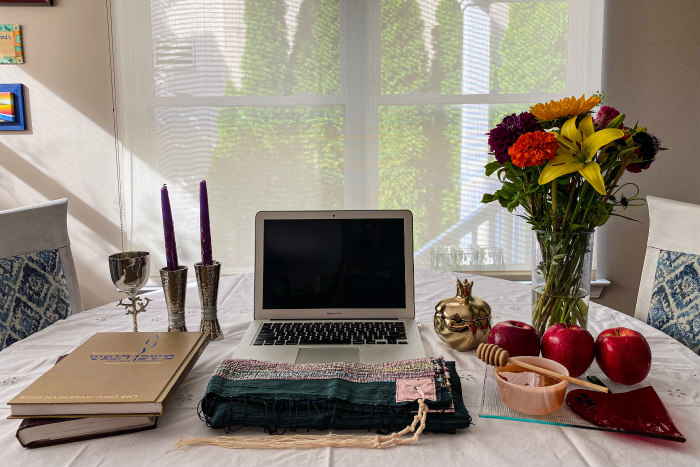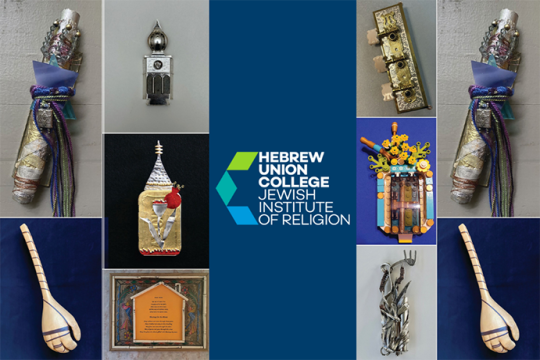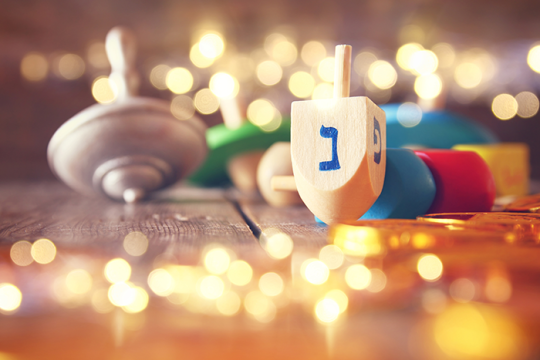How to Turn Your Home into a Sanctuary for the High Holidays

With the current health pandemic and restrictions on group gatherings, our kitchens have become our classrooms, our basements are our yoga studios, and our dining rooms are now our offices. Where, then, are our synagogues?
The ancient rabbis asked this same question right after the destruction of the Second Temple in 70CE. Without a localized place of worship, how could we pray together? They certainly didn’t have Zoom or livestreams; they didn’t worry about ring lights or hiring staging companies.
We are the inheritors of their simple answer: Our home would become our mikdash m’at, the miniature Beit Hamikdash (Temple). Our table would be the mizbei-ach (altar), and we would be the priests – and so Jewish worship was literally brought inside.
Now, we must again bring worship “inside” and create a sacred space at home while we are in front of our computers.
This year, with many synagogues having online Rosh HaShanah and Yom Kippur services, we have a unique opportunity to create a mikdash m’at, a home sanctuary for these upcoming holy days. These 10 suggestions are meant to help you actualize a communal atmosphere while enhancing your home holiday experience. Families can easily adapt these activities to involve children.
Please don’t be overwhelmed or hard on yourself if you cannot manage it all. Do whatever is possible and comfortable for your own living situation. May all our efforts add meaning to the coming Days of Awe.
- Choose your prayer space in advance, spending a few moments of individual contemplation/family discussion. Look at any possible space and think about ways to make it special.
- Say a blessing or (intention) over it to mark it as your mikdash m’at.
- Put a cushion or festive pillow on your chair, or drape it with a , scarf, or special fabric.
- Cover the desk or table where your computer will be with a white tablecloth, runner, or placemat, and flowers.
- Find meaningful objects to grace your space: holiday objects like candlesticks, a , apples and honey. Cherished mementos, family heirlooms, and photos of loved ones can surround you. If you own a , put it where it’s visible.
- Move the computer space back so that you are watching the screen more than operating or manipulating it.
- Limit or disconnect auditory distractions. Turn off your phone and email, and text message ping sounds.
- Wear clothing that makes you feel as if you are entering a spiritual space.
- Hold a , even if your synagogue uses visual or pages onscreen. Feel its cover and flip its pages, remembering the times you’ve used it before. Inscribe it with a special phrase for this year.
- Many synagogues have a decorative work on the wall called a shiviti, taken from the first Hebrew word of the verse, “I always set before me” (Psalms 16:8). Make a family shiviti or buy one online. Perhaps all service participants can have the same devotional wall hanging.
Here are a few verses and blessings to help create your sacred space:
- Use the last line of the blessing said at Havdalah separating Shabbat from the weekday to “separate” your sacred space:
בָּרוּךְ אַתָּה יְיָ, הַמַּבְדִיל בֵּין קֹֽדֶשׁ לְחוֹל.
Baruch atah Adonai, hamavdil bein kodesh l’chol.
Blessed are You Adonai, who separates between holy and ordinary.
- Birkat Habayit (home blessing):
בְּזֶה השַּׁעַר לֹא יָבוֹא צַעַר
בְּזֹאת הַדִּירָה לֹא תָבוֹא צָרָה
בְּזֹאת הַמַּחְלָקָה לֹא תָבוֹא מַחְלוֹקֶת
זֶה הַמָּקוֹם תְּהִי בְרָכָה וְשלוֹם
B’zeh hashaar lo yavo tzaar
B’zot hadirah lo tavo tzarah
B’zot hamachlakah lo tavo machloket
B’zeh hamakom t’hi b’rachah v’shalom
Let no sorrow come through this gate.
Let no trouble come in this dwelling.
Let no fright come through this door.
Let no conflict come to this section.
Let there be blessing and peace in this place.
- Numbers 24:5:
מַה טֹּֽבוּ אֹהָלֶֽיךָ יַעֲקֹב, מִשְׁכְּנֹתֶֽיךָ יִשְׂרָאֵל.
Mah tovu oholecha Yaakov, mishk’notecha Yisrael
How good are your tents, O Jacob, Your sacred places, O Israel!
- Exodus 20:21:
בְּכָל-הַמָּקוֹם אֲשֶׁר אַזְכִּיר אֶת-שְׁמִי, אָבוֹא אֵלֶיךָ וּבֵרַכְתִּיךָ.
B’chol mako masher azkir et sh’mi avo eilecha uveirachticha.
In every place where My name is mentioned, I will come to you and bless you.
- Exodus 3:5:
כִּי הַמָּקוֹם אֲשֶׁר אַתָּה עוֹמֵד עָלָיו, אַדְמַת-קֹדֶשׁ הוּא.
Ki hamakom asher atah omed alav admat kodesh hu.
Indeed, the place on which you stand is holy ground.
What home sanctuary will you create? Take a photo and share it with us on Twitter, Facebook, or Instagram.
Related Posts

Six Symbols to Showcase Jewish Pride

What Message Does the Mezuzah Have Right Now?


